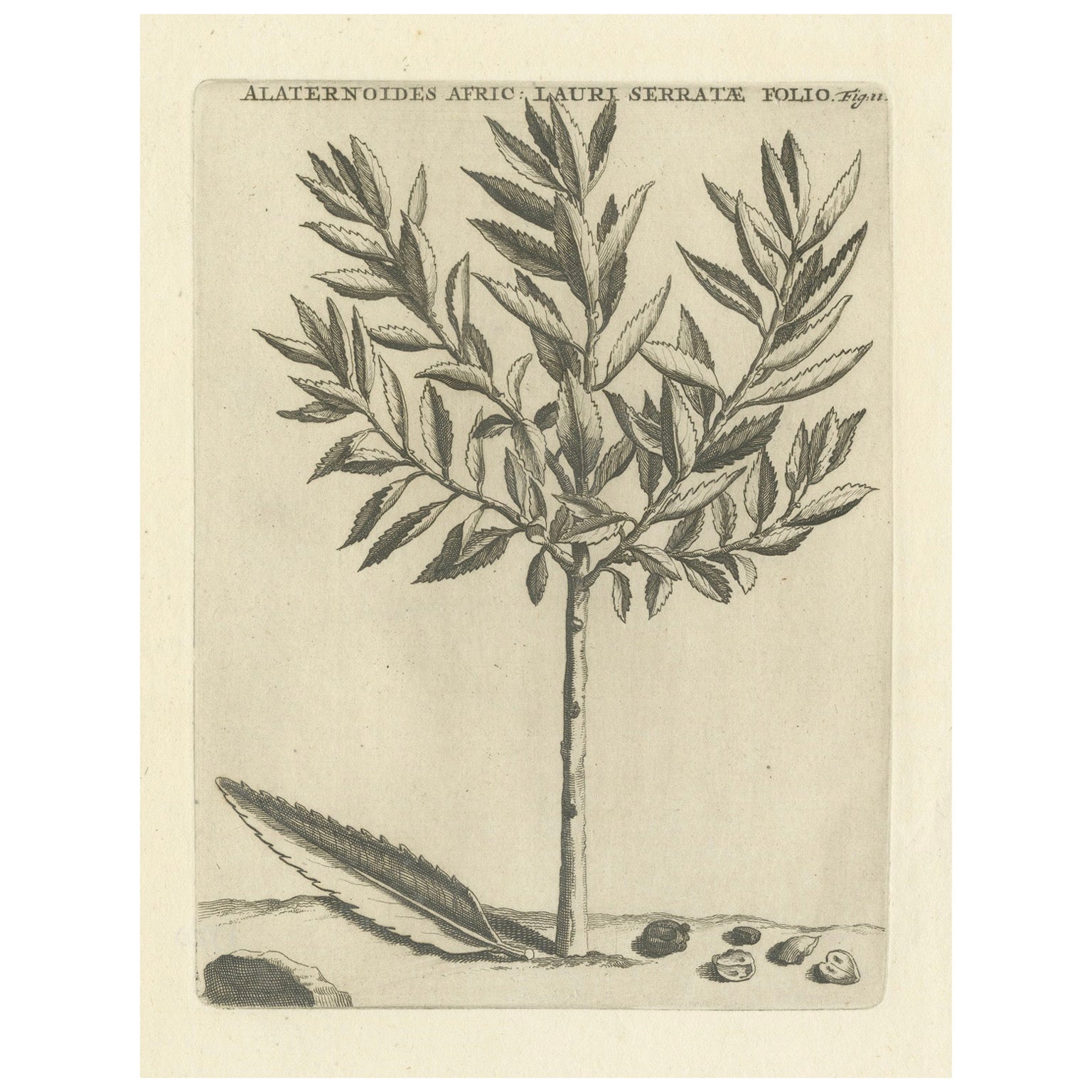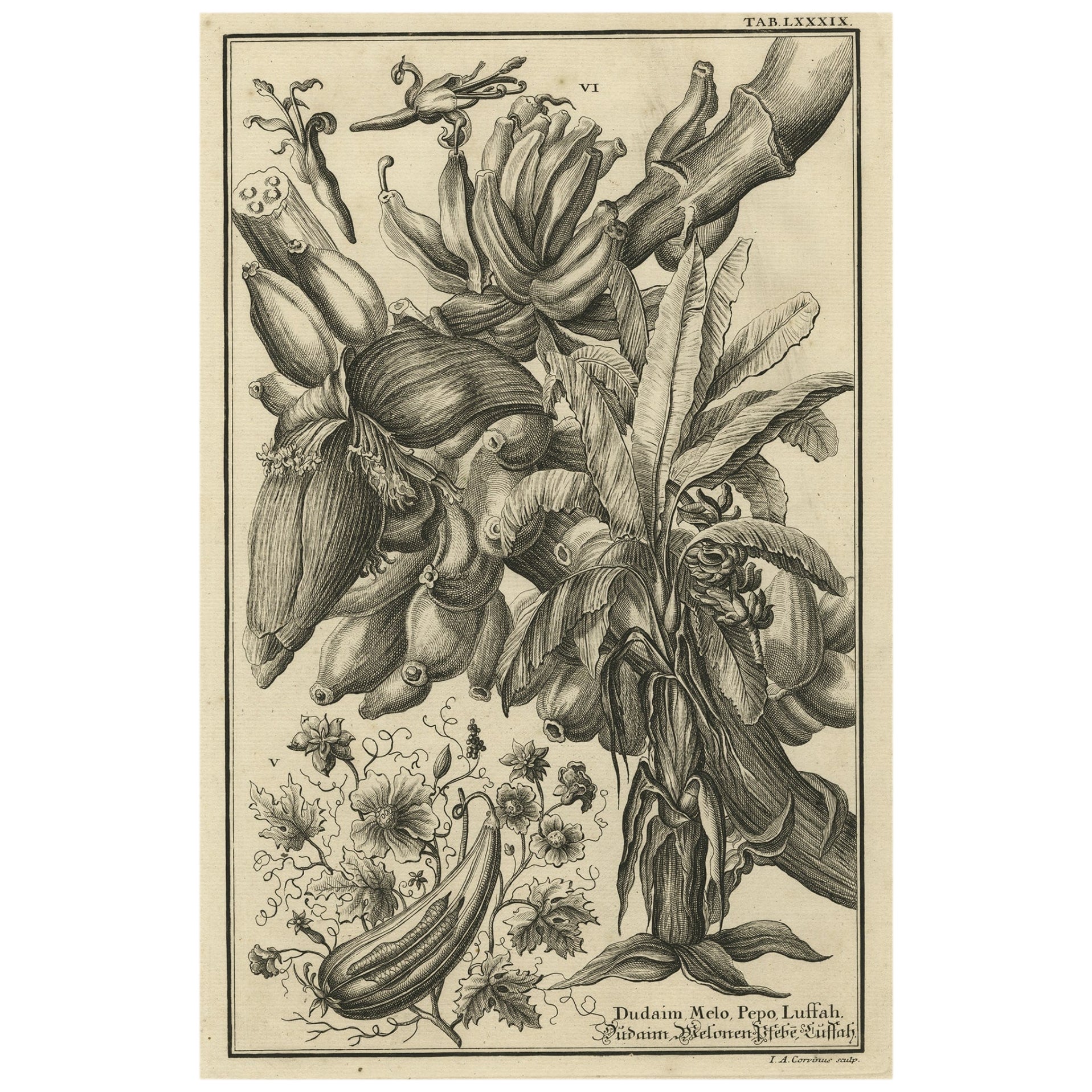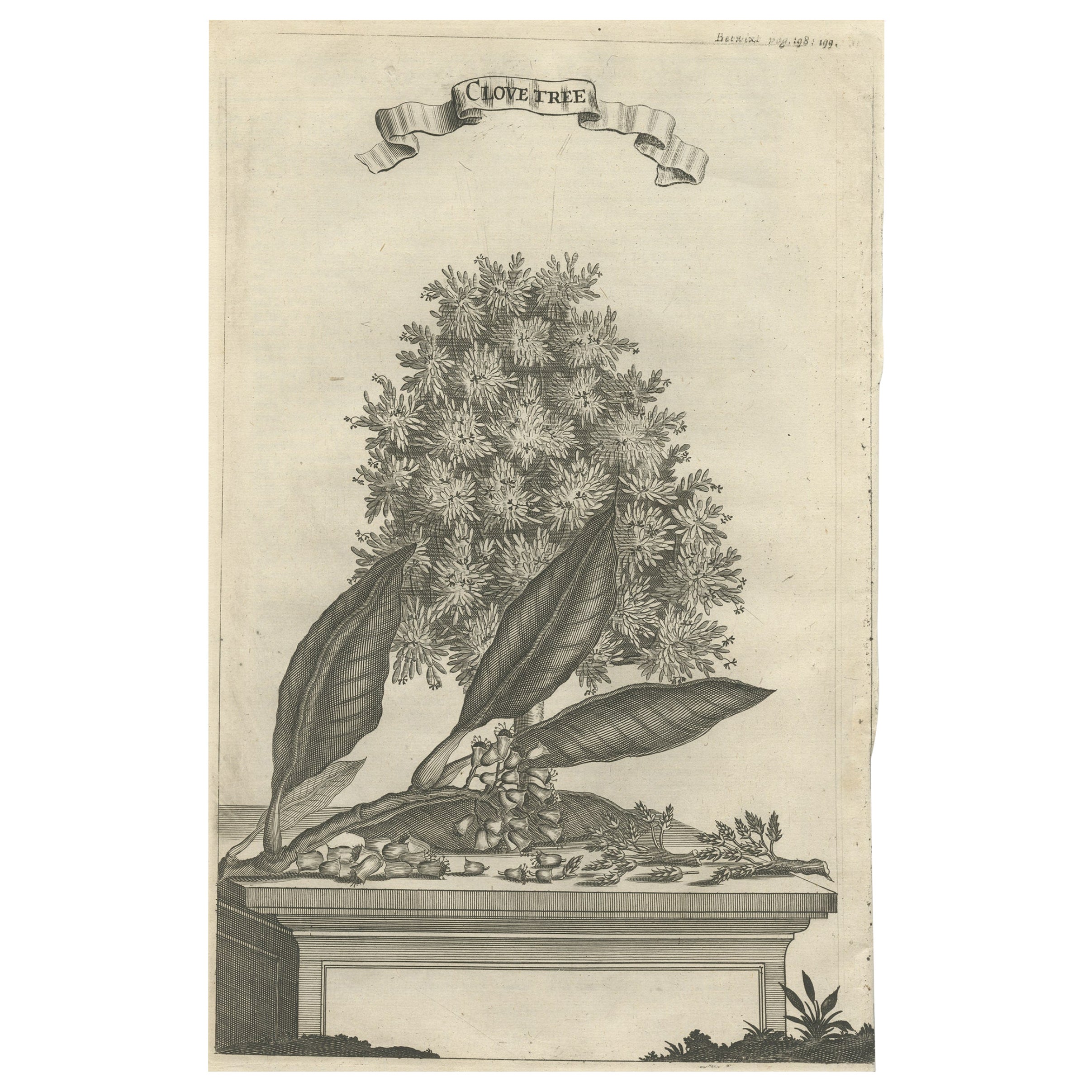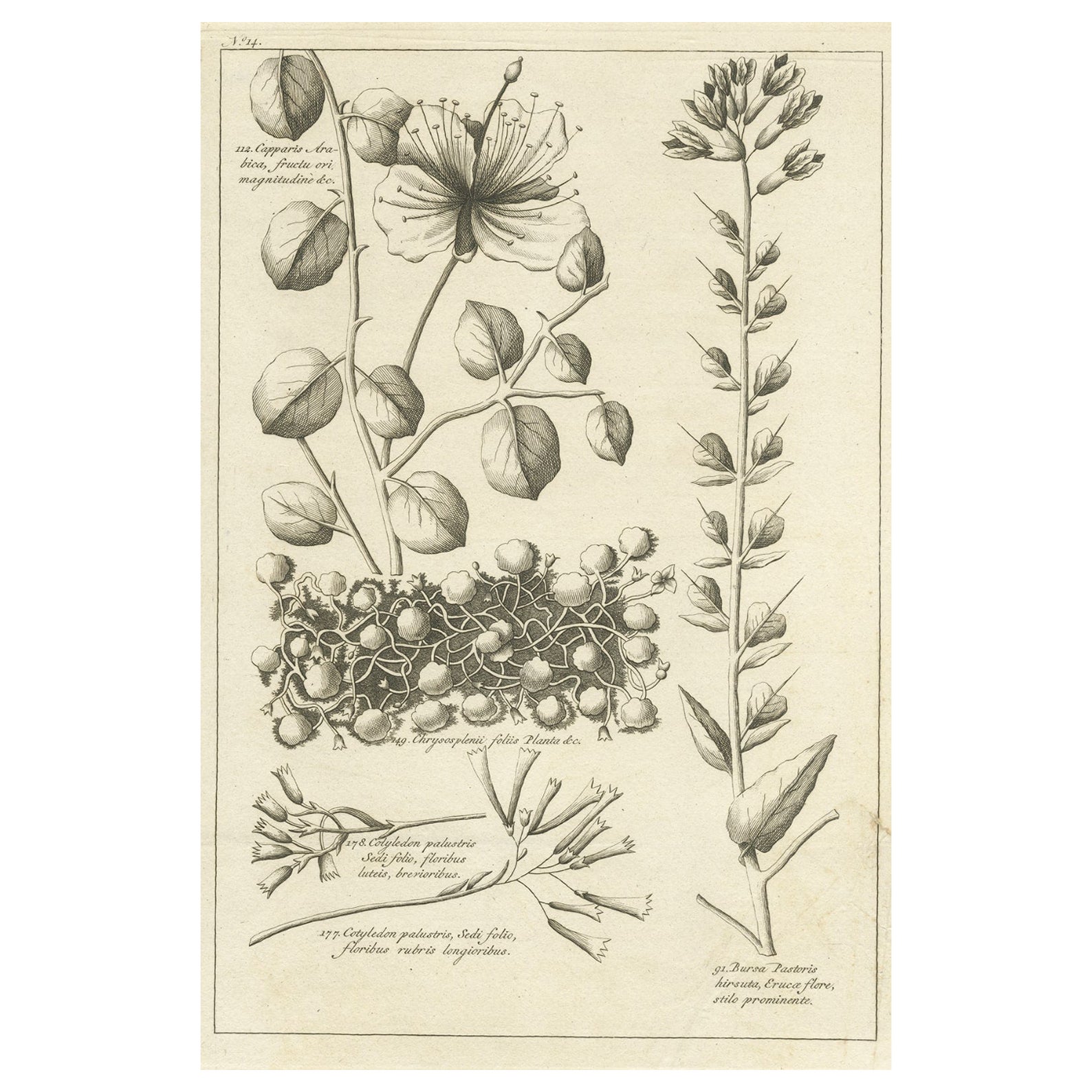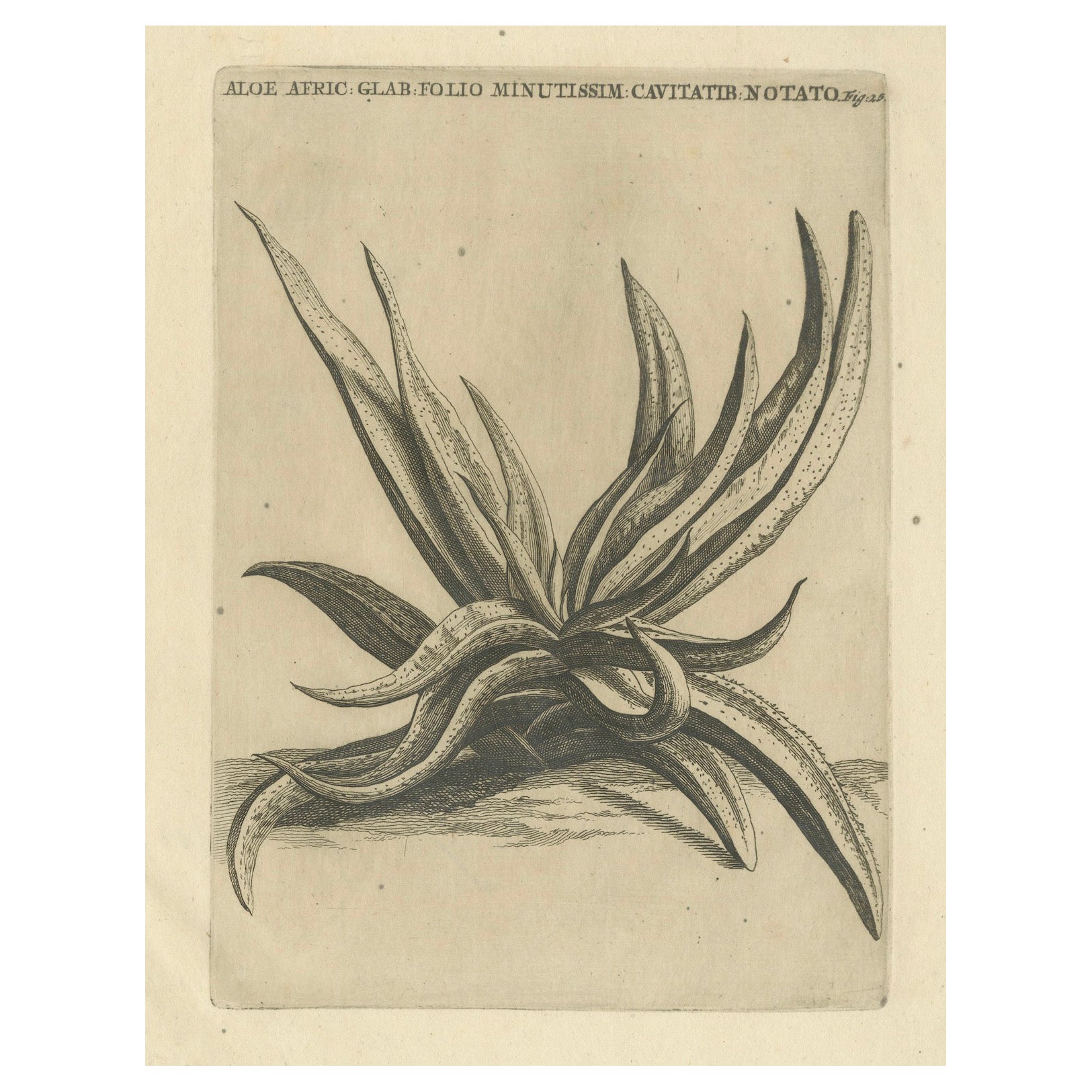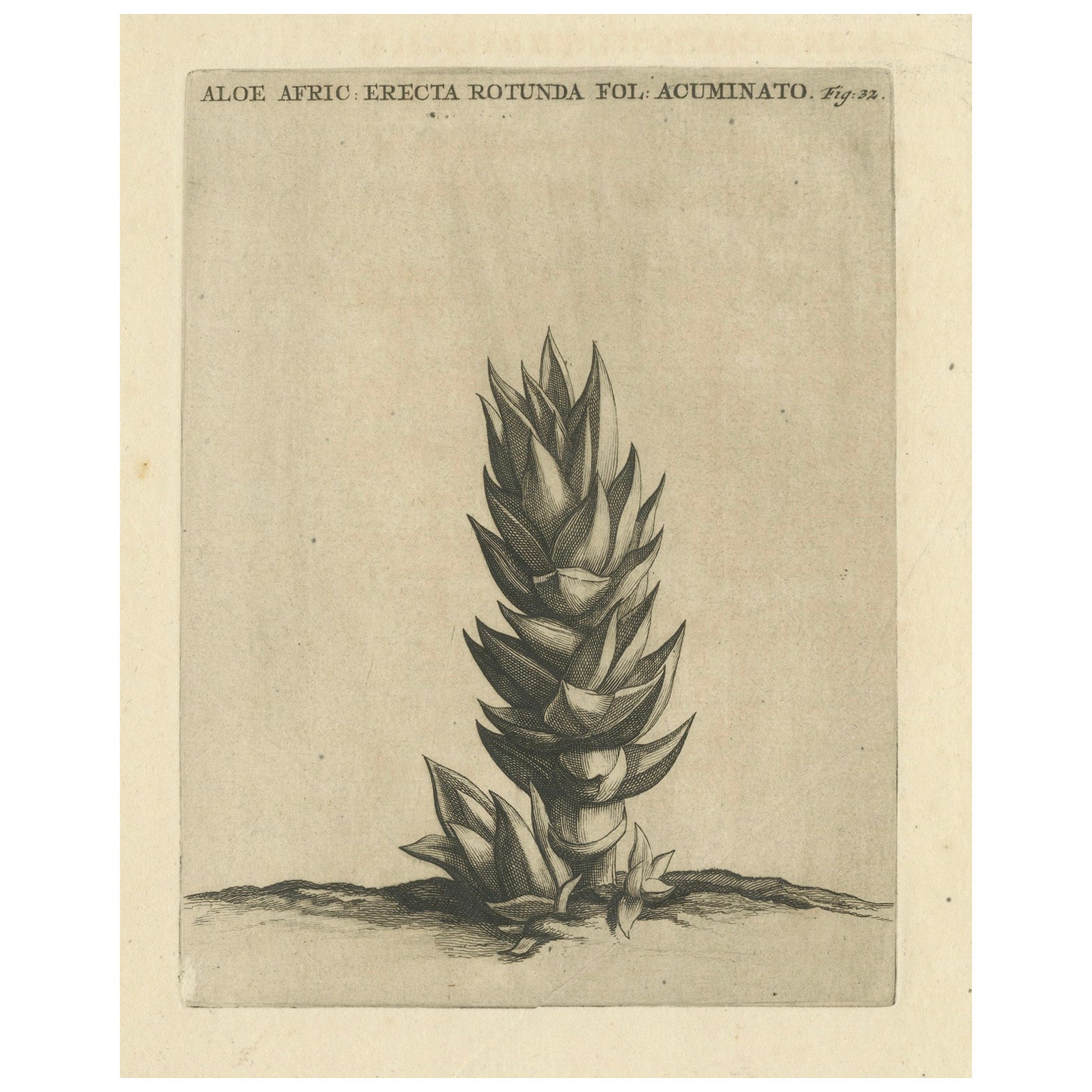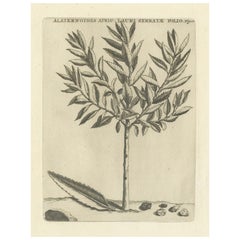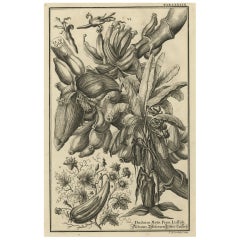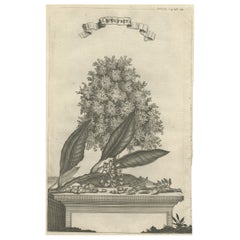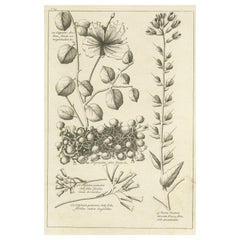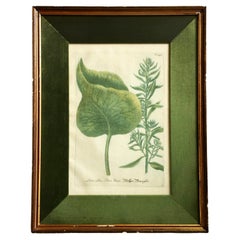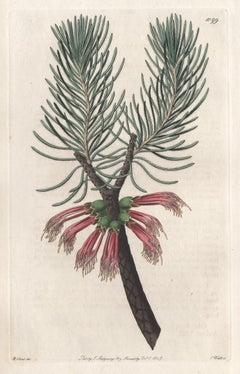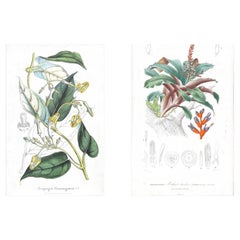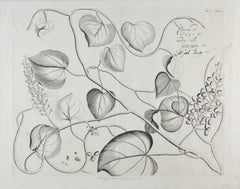Items Similar to Botanical Engraving of Tithymalus Aiz Arbor from Caspar Commelin’s Work, 1706
Want more images or videos?
Request additional images or videos from the seller
1 of 6
Botanical Engraving of Tithymalus Aiz Arbor from Caspar Commelin’s Work, 1706
$275
$343.7520% Off
£205.95
£257.4420% Off
€232
€29020% Off
CA$385.48
CA$481.8520% Off
A$424.71
A$530.8920% Off
CHF 219.86
CHF 274.8220% Off
MX$5,113.61
MX$6,392.0220% Off
NOK 2,783.90
NOK 3,479.8820% Off
SEK 2,615.30
SEK 3,269.1220% Off
DKK 1,766.82
DKK 2,208.5220% Off
About the Item
Botanical Engraving of Tithymalus Aiz Arbor from Caspar Commelin’s Work, 1706
This engraving is possibly a botanical illustration from Caspar Commelin's "Praeludia Botanica," published in 1703. It depicts *Tithymalus Aiz Arbor Caudice Angulneri Fol*, an exotic plant species with distinct angular stems and narrow leaves. The Latin title translates to "Tithymalus Aiz tree with angular stems and oleander-like leaves," referring to its unique structural features.
This engraving could be a proof print (proefdruk) of Caspar Commelin's work, *"Horti Medici Amstelaedamensis Plantæ Rariores et Exoticæ ad Vivum Æri Incisæ,"* published in 1706 by Fredericum Haringh in Leiden (Lugduni Batavorum).
The style and botanical detail in the engraving align with the scientific and illustrative approach typical of the Commelins' botanical works. These illustrations were often created directly from life ("ad vivum") to accurately document rare and exotic plants, many of which were housed at the Amsterdam Hortus Medicus.
Given that proof prints were commonly produced to ensure accuracy before inclusion in published works, this engraving might be part of the preparatory process for Commelin's publications. It fits with the layout and descriptions found in the 1706 edition of Caspar Commelin's botanical works, which continued the legacy initiated by his uncle, Jan Commelin.
### Description:
The engraving shows a plant with a tall, angular stem and elongated, broad leaves. The leaves grow along the length of the stem in a spiral pattern, giving the plant a striking appearance.
- Stem and Leaves: The illustration emphasizes the plant’s angular stem, which supports a number of broad, curving leaves. The texture of the stem and the gentle curves of the leaves are captured with fine detail, showing the plant’s natural form.
- Growth Pattern: The plant stands upright with leaves growing in a spiral pattern along the stem, gradually tapering toward the top. The simple background allows the viewer to focus entirely on the botanical details of the plant.
### Maker:
This engraving likely belongs to the series produced under the supervision of Caspar Commelin for his botanical publications. Caspar Commelin took over the work of his uncle, Jan Commelin, documenting rare and exotic plants brought to Europe, primarily through Dutch colonial and trade networks. Their botanical works, such as *"Horti Medici Amstelaedamensis,"* were significant in early efforts to classify and describe plants from around the world.
### What It Shows:
The engraving provides a detailed depiction of the Tithymalus Aiz Arbor, showcasing its angular stem and oleander-like leaves. The plant is native to regions outside Europe and was valued for its ornamental and possibly medicinal uses. This engraving serves as an accurate scientific illustration, helping botanists and herbalists study the plant's unique characteristics.
This engraving likely contributed to European efforts in the 18th century to classify and document exotic species, focusing on their botanical features and potential uses.
- Dimensions:Height: 9.34 in (23.7 cm)Width: 7.29 in (18.5 cm)Depth: 0 in (0.02 mm)
- Materials and Techniques:Paper,Engraved
- Period:1700-1709
- Date of Manufacture:1706
- Condition:Condition: very good, given age. Etching / engraving on hand-laid (verge) paper. Light foxing, mostly outside the plate-mark. General age-related toning and/or occasional minor defects from handling. Study the scans carefully.
- Seller Location:Langweer, NL
- Reference Number:Seller: BG-13748-1281stDibs: LU3054341525622
About the Seller
5.0
Recognized Seller
These prestigious sellers are industry leaders and represent the highest echelon for item quality and design.
Platinum Seller
Premium sellers with a 4.7+ rating and 24-hour response times
Established in 2009
1stDibs seller since 2017
2,667 sales on 1stDibs
Typical response time: <1 hour
- ShippingRetrieving quote...Shipping from: Langweer, Netherlands
- Return Policy
Authenticity Guarantee
In the unlikely event there’s an issue with an item’s authenticity, contact us within 1 year for a full refund. DetailsMoney-Back Guarantee
If your item is not as described, is damaged in transit, or does not arrive, contact us within 7 days for a full refund. Details24-Hour Cancellation
You have a 24-hour grace period in which to reconsider your purchase, with no questions asked.Vetted Professional Sellers
Our world-class sellers must adhere to strict standards for service and quality, maintaining the integrity of our listings.Price-Match Guarantee
If you find that a seller listed the same item for a lower price elsewhere, we’ll match it.Trusted Global Delivery
Our best-in-class carrier network provides specialized shipping options worldwide, including custom delivery.More From This Seller
View AllBotanical Engraving of Alaternoides Afric Lauri Serratae from Commelin, 1706
Located in Langweer, NL
Botanical Engraving of Alaternoides Afric Lauri Serratae from Caspar Commelin, 1706
This engraving is possibly a botanical illustration from Caspar Commelin's *"Praeludia Botanica,"...
Category
Antique Early 1700s Dutch Prints
Materials
Paper
$257 Sale Price
25% Off
Biblical Botanical Print – Dudaim Melon Engraving by Corvinus, 1731
Located in Langweer, NL
Dudaim Melon Botanical Engraving – Corvinus after Scheuchzer, 1731
This antique botanical print, titled ‘Dudaim, Melo, Pepo, Luffah,’ depicts the Dudaim Melon (Cucumis melo var. dudaim) alongside flowering vines and fruits in striking baroque style. It originates from Johann Jakob Scheuchzer’s monumental work Physica Sacra...
Category
Antique 1730s Swiss Prints
Materials
Paper
Rare Old Copper Engraving of a Clove Tree in the East Indies, Asia, 1659
Located in Langweer, NL
Antique print titled 'Clove Tree'.
Copper engraving of a clove tree. This print originates from 'Voyages and Travels to the East-Indies' by J. Nieuhof.
Artists and engravers:...
Category
Antique 1650s Prints
Materials
Paper
$265 Sale Price
20% Off
Antique Engraving of the Caper Bush and Other Plants, 1773
Located in Langweer, NL
Antique print titled 'Capparis Arabica (..)'. Old botany print depicting the caper bush, shepherd's purse and other plants. Originates from the first Dutch editon of an interesting t...
Category
Antique 18th Century Prints
Materials
Paper
$208 Sale Price
20% Off
Botanical Engraving of African Aloe from Commelin’s "Praeludia Botanica", 1703
Located in Langweer, NL
African Aloe Botanical Engraving from Caspar Commelin’s "Horti Medici Amstelaedamensis," 1706
This engraving is possibly a botanical illustration from Caspar Commelin's "Praeludia B...
Category
Antique Early 1700s Prints
Materials
Paper
$275 Sale Price
20% Off
Botanical Engraving of Aloe Afric Erecta from Caspar Commelin's Work, 1706
Located in Langweer, NL
Botanical Engraving of Aloe Afric Erecta from Caspar Commelin's Work, 1706
This engraving is likely a botanical illustration from Caspar Commelin's "Praeludia Botanica," published i...
Category
Antique Early 1700s Prints
Materials
Paper
$275 Sale Price
20% Off
You May Also Like
1736-45 Framed Botanical Engraving, Johann Wilhelm Weinmann
By Johann Wilhelm Weinmann
Located in Louisville, KY
Framed Botanical Engraving, Johann Wilhelm Weinmann. Johann Wilhelm Weinmann (German 1683-1741) Published in Amsterdam & Ratisbon, 1736-45....
Category
Antique Mid-18th Century German Other Prints
Materials
Velvet, Giltwood, Paper
Calothamnus Villosa, 19th century Australian native botanical engraving print
Located in Melbourne, Victoria
'Calothamnus Villosa - Villous Calothamnus'
Original engraving with original hand-colouring by S Watts After M Hart, 1827.
Native plant of Australia.
...
Category
Early 19th Century Naturalistic Still-life Prints
Materials
Engraving
Set of Two Rare Botanical Engravings by D’Orbigny — 1849
Located in Fukuoka, JP
Set of Two Rare Botanical Engravings by D’Orbigny — Dictionnaire Universel d’Histoire Naturelle, Paris, 1849
An exquisite pair of original hand-colored botanical engravings from the...
Category
Antique 19th Century French Prints
Materials
Paper
Citamerdu (Amrita) Plant: 17th Century Botanical Engraving by Hendrik van Rheede
Located in Alamo, CA
This is a rare 17th century engraving of a plant entitled "Citamerdu" by the Dutch botanist Hendrik van Rheede tot Drakenstein, plate 21 from his 'Hortus Indicus Malabaricus' (Garden of Malabar), published in Amsterdam in 1686 by Johann van Someren. The engraving depicts the Citamerdu plant, also known as Tinospora cordifolia plant or Amrita and Guduchi. It is a deciduous plant with heart-shaped leaves, greenish flowers, and pea-shaped fruits. Rheede's 19th century publication featured illustrations of exotic plants and fruits labelled with script in the upper right corner in Latin, Malay, Arabic, and Sanskrit. Hortus Indicus Malabaricus is believed to be the earliest comprehensive published work on the flora of Asia and the tropics. The 17th century treatise featured important illustrations of 740 plants of the region, including Indian medicinal plants.
The engraving is printed on 17th century laid, chain-linked paper, watermarked with an elaborate crown design. The sheet measures 15.75" high by 18.75" wide. There is a central fold, as issued. There are a few small spots, but the print is otherwise in excellent condition.
There are additional Rheede botanical engravings from his 'Hortus Indicus Malabaricus' publication that are listed on my 1stdibs storefront and online website. These would make for an impressive display grouping. A discount is available for purchase of two or more of the prints.
Hendrik Adriaan van...
Category
Late 17th Century Naturalistic Landscape Prints
Materials
Engraving
Quivisia; Portesia /// Antique Botanical Botany Plants Science Engraving Buffon
By Georges-Louis Leclerc, Comte de Buffon
Located in Saint Augustine, FL
Artist: Georges-Louis Leclerc, Comte de Buffon (French, 1707-1788)
Title: "Quivisia; Portesia" (Octandreie, Monogynie, Plate 302)
Portfolio: Histoire Naturelle
Year: 1749-1789
Medium: Original Hand-Colored Engraving on laid paper
Limited edition: Unknown
Printer: Imprimerie Nationale, Paris, France
Publisher: Georges-Louis Leclerc, Comte de Buffon, Paris, France
Framing: Not framed, but beautifully double matted with hand decorated archival French matting...
Category
2010s Naturalistic Still-life Prints
Materials
Watercolor, Engraving, Laid Paper, Intaglio
Collection of Nine 18th Century Tropical Botanical Engravings by Georg Dionysius
By Georg Dionysius Ehret
Located in Tetbury, Gloucestershire
Collection of nine 18th Century tropical botanical engravings by Georg Dionysius Ehret.
Hand coloured prints depicting local flora of Barbados. Each is dedicated to a prominent perso...
Category
Antique 18th Century German Prints
Materials
Paper
More Ways To Browse
Vintage Blanket Basket
Vintage Brass Tiger
Vintage Brown Snuff Bottles
Vintage Ceramic Rabbits
Vintage Decoupage Paper
Vintage Electric Iron
Vintage Horn Table
Vintage Ibis
Vintage Marble Top Garden Table
Vintage Room Thermometer
Vintage Rooster Plate
Vintage Rooster Plates
Vintage Stetson
Vintage Steuben Glass Bowl
Vintage Sunroom Furniture
Vintage Wall Thermometer
Vintage Woodworking Tools
Wall Secretary
